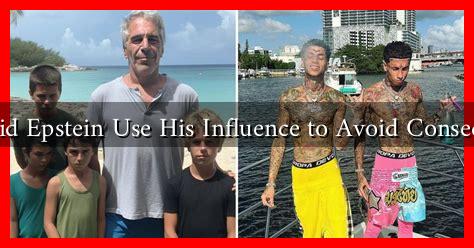-
Table of Contents
How Did Epstein Use His Influence to Avoid Consequences?
Jeffrey Epstein, a financier and convicted sex offender, became infamous not only for his heinous crimes but also for his ability to evade justice for many years. His case raises critical questions about power, privilege, and the systemic failures that allowed him to manipulate the legal system. This article explores the various ways Epstein leveraged his influence to avoid consequences for his actions.
The Power of Connections
Epstein’s extensive network of high-profile connections played a significant role in his ability to escape accountability. He cultivated relationships with influential figures across various sectors, including politics, business, and entertainment. Some notable connections included:
- Former President Bill Clinton
- British Prince Andrew
- Les Wexner, CEO of L Brands
- Harvard Law Professor Alan Dershowitz
These relationships not only provided Epstein with social capital but also created a protective barrier that shielded him from scrutiny.
. His connections often lent him credibility, making it difficult for victims to be taken seriously when they came forward with allegations against him.
Financial Resources and Legal Maneuvering
Epstein’s wealth was another crucial factor in his ability to avoid consequences. With an estimated net worth of over $500 million, he had the financial means to hire top-tier legal representation. His legal team employed various strategies to minimize the repercussions of his actions:
- Negotiated Plea Deals: In 2008, Epstein struck a controversial plea deal in Florida, pleading guilty to lesser charges of soliciting prostitution from a minor. This deal allowed him to serve just 13 months in a work-release program, despite the severity of the allegations against him.
- Intimidation Tactics: Epstein was known to use intimidation against his accusers. Reports suggest that he hired private investigators to dig into the backgrounds of those who spoke out against him, creating a chilling effect on potential whistleblowers.
- Legal Technicalities: Epstein’s lawyers often exploited legal loopholes and technicalities to delay proceedings and dismiss charges. This tactic prolonged legal battles and allowed him to continue his illicit activities.
Media Manipulation and Public Perception
Epstein also understood the power of media and public perception. He often used his wealth to cultivate a positive public image, portraying himself as a philanthropist and a successful businessman. This image helped him gain access to elite social circles and deflect criticism. Some strategies included:
- Philanthropy: Epstein donated substantial sums to various causes, including science and education, which helped him gain favor among influential individuals and institutions.
- Media Presence: Epstein maintained a presence in high-society events and was often photographed with celebrities and politicians, reinforcing his status and influence.
Systemic Failures in the Justice System
The Epstein case also highlights significant systemic failures within the justice system. Several factors contributed to his ability to evade justice:
- Corruption and Collusion: Allegations of corruption among law enforcement and judicial officials in Florida raised questions about the integrity of the legal process. Some officials reportedly received donations from Epstein, which may have influenced their decisions.
- Victim Blaming: Many victims faced skepticism and victim-blaming when they came forward, which discouraged them from pursuing justice. The stigma surrounding sexual abuse often silenced victims, allowing Epstein to continue his predatory behavior.
Conclusion
Jeffrey Epstein’s ability to avoid consequences for his actions was a complex interplay of influence, wealth, and systemic failures. His connections to powerful individuals, financial resources, media manipulation, and the shortcomings of the justice system all contributed to his prolonged evasion of accountability. The Epstein case serves as a stark reminder of the need for reform in how society addresses issues of power, privilege, and sexual abuse. It underscores the importance of believing and supporting victims, ensuring that justice is served regardless of an individual’s status or wealth.
For further reading on the Epstein case and its implications, you can visit The New York Times.





